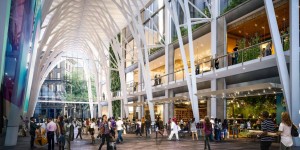
The Great Hall, a 13,000-square-foot space to run between Federal and Devonshire streets, is the centerpiece of Millennium Partners’ proposal for the redevelopment of Winthrop Square.
It’s time to say good riddance to the state’s silly shadow law.
The aim of a pair of arcane and quixotic 1990 statutes – technically two separate laws, one for Boston Common, the other for the Public Garden – are to protect the crown jewels of the city’s park system from the shadows that would be cast by new towers.
But the reality of the law is much different and its application not so noble. In fact, it is just another one of the many obstacles to new development and construction for which Boston is infamous and which ultimately work in favor of deep-pocketed and savvy developers with the ability to work around it.
The losers are other developers with valid ideas and proposals that could help boost the vitality of downtown and build more badly needed housing, but won’t get a shot or will be forced to scale back their plans because the “barriers to entry” are effectively rigged against them.
As it stands now, the law itself, combined with a proposed Walsh administration workaround, will let Millennium Partners slip past the cumbersome shadow law with plans to replace a crumbling city parking garage at Winthrop Square with a 750-foot-tall condominium and office tower, even as it effectively bars any new, competing towers from taking shape nearby.
This is especially bad news for the city’s aging and listless Financial District, where Millennium hopes to build its newest tower.
City officials have proposed amending the state law to let Millennium’s project move forward. The idea is to let Millennium tap into a so-called “shadow bank,” which allows a certain amount of additional shade to be cast on the Common and the Garden by new towers before the limit is reached.
As Millennium has pledged to shell out $153 million for the city’s decrepit Winthrop Square parking garage, you can see why the Walsh administration is eager to cut a deal.
Letting Millennium move forward while keeping the shadow law in place appears to solve one problem – but it lays the groundwork for an even bigger mess over the long term. Millennium’s new skyscraper would wipe out the shadow bank, leaving little or no flexibility for future developers looking to build their own towers.
Millennium used up most of the space in the shadow bank with its 2001 Ritz-Carlton condo towers across from the Common on Washington Street. The developer went on to snag another juicy deal when it took over plans to renovate the historic Filene’s building and build a tower next door after a previous developer left a big hole in the ground following the Great Recession.
The new Millennium Tower in Downtown Crossing is now nearly sold out, including its top floor, a $35 million penthouse.
Stifling Competition
It’s safe to say that Millennium executives, who negotiated Boston’s tough development market over the years with help from a strong relationship with the late Mayor Thomas M. Menino, have gotten off on the right foot with Boston Mayor Marty Walsh as well. Millennium has done just fine over the years negotiating Boston’s byzantine maze of development rules and a review process that has long been manipulated by city officials and neighborhood activists to various ends.
The advantage that Millennium and a handful of other developers enjoy in Boston has been spelled out succinctly by Boston Properties, the big office developer, which has made no bones about telling investors it deliberately focuses on markets like Boston with high barriers to entry.
After all, once you’re in, it’s hard for anyone else to come in and build a competing project.
I caught up last week with Millennium’s Joe Larkin, who disputed the idea that the developer would ultimately benefit from the shadow law by effectively barring any new competition to the developer’s planned Winthrop Square tower.
That said, the Millennium principal didn’t exactly endorse scrapping the law, either. In fact, Larkin made the case that Millennium was genuinely surprised by the fact that the decades-old law would have a significant impact on the proposed Winthrop Square.
While the developer has built two projects within a couple blocks of the Common, Millennium never thought that a new tower a quarter mile away from Boston’s two most cherished parks would also be subject to the tower law.
“We missed it,” Larkin said.
Still, it shouldn’t have been a complete mystery. The shadow issue reared its shady head when Menino proposed his 1,000-foot tower on the Winthrop Square garage site in 2006, quickly dubbed “Tommy’s Tower” by the Boston Herald. It arose again when a “skinny tower” at was proposed at 171 Tremont St. a few years ago.
I recall a certain front-page splash I wrote about Tommy’s Tower facing problems from the state’s shadow law.
“We should have looked at your archives,” Larkin said. Well yes, that and a lot more as well, it would seem.
But as much as a headache the shadow law has created for Millennium, in the long run it will help block any competitors from building rival condo and office towers. And while that may be a great deal for any developer, that’s not so good for Boston – especially as the city looks for ways to reenergize a Financial District that appears perpetually stuck in a 1970s time warp.




 |
| 



